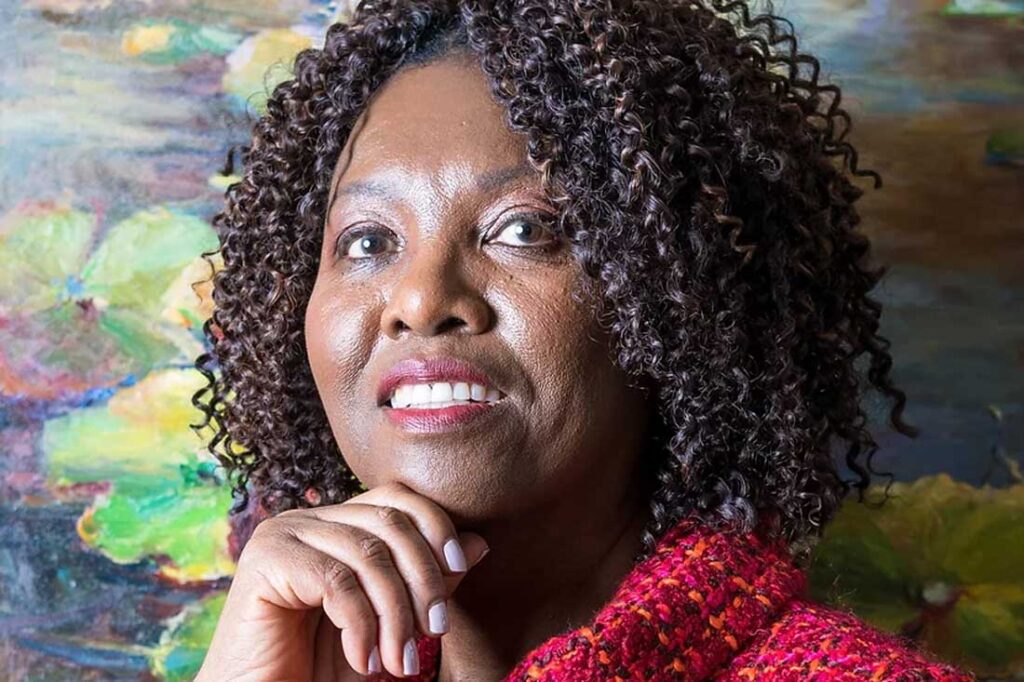Today, Marcia Hunter is an educator, life coach and author with an impressive three-decade career in higher education. Ask her how she got to that point, and she’ll tell you it’s been a lifelong journey.
Literally: “It seems like my career got started as a child,” she says.
Growing up in rural Jamaica, Hunter had an innate knack for helping her classmates stay out of trouble. This talent is known as “deescalation” today. If there were a disagreement among students, she was the person who’d go and talk to them, calming them down so that a teacher wouldn’t have to get involved and no one would need to be disciplined. Male or female, older or younger—Hunter found she had a gift for helping peers talk through their conflicts and negative feelings. By the time she was in high school, she was the de facto counselor for friends and acquaintances navigating relationships and thinking about their futures.
“I was doing life coaching before life coaching was life coaching,” she says with a chuckle.
Still, young Hunter always thought she’d have a career in nursing—like her mom—or science. It wasn’t until she attended college and took her first psychology class that she realized that’s exactly what she’d been doing when she helped her classmates. And it was exactly what she wanted to pursue in her career.
She got a bachelor’s degree and then a master’s degree in counseling psychology. She started teaching at Southwest Tennessee Community College, and a doctoral degree in instruction and curriculum leadership followed.
Listening to help others
Along the way, she found that though she was far from the schoolhouse of her rural Jamaican childhood, she was still called to counsel and guide the students who came through her door. “I think I attracted students with issues to be resolved because I’m a psychologist,” she muses.
One of those students was Pamela Berry Banks, who came to Hunter as an undergraduate student in her psychology class. As a first-generation African-American student, Banks felt Hunter was someone whose leadership she could trust—someone who was thoughtful and kind, whose authority came from a place of caring.
Among Hunter’s greatest gifts? “Listening to understand,” Banks says. Right away, she felt Hunter had the ability to see when something was holding her students back, whether it was related to the subject matter in class or external factors outside of the college.
Even Banks, who describes herself as “a pretty private person,” soon found herself sharing what was really going on. Her professor had a knack for getting her to open up. Not only would Hunter call to hear how things were going, but she’d listen for the wavering uncertainty in Banks’ voice that meant maybe things weren’t going as well as she’d want them to. “She interacted with me with intention, to make sure that I was successful,” Banks says.
Marcia Hunter wants to help you achieve your dreams
All her life, Hunter has been combining psychology with social service. As a life coach, she encourages people and organizations to dream big and act boldly. Her new book, Dream Achievement: The 6 Step Plan To An Inspired Life and Meaningful Success—which features a foreword from renowned author and motivational speaker Les Brown—outlines a six-step plan for living an inspired life.
“The book starts with dreaming—solidifying the definition and the process of effective dreaming,” Hunter explains. “A lot of times, people have a negative connotation of dreaming; they’ll say, ‘Oh, she’s just a dreamer, all she does is daydream.’”
Hunter encourages readers to look at dreaming in a positive light: as not just a faraway fantasy but a meaningful first step toward achieving something great. After all, many of the most successful innovators and entrepreneurs are dreamers. But they have the will and skill to channel their dreams into action—something Hunter’s book helps with, with insight into intentional goal setting and other practical strategies for dreamers.
“It’s OK to dream,” Hunter proposes. “Once it’s OK to dream, what are you going to do with that dream?”
Dream Achievement also deals with mindset and leadership. Before we can lead others, Hunter says, “we’ve got to lead ourselves.”
Banks recalls Hunter encouraging her dreams, from the time she was a student until she was long into her career. (The two still talk on the phone today.)
“She kept telling me what I was, despite what I thought I was,” Banks says. “She reminded me what I could do. And it was life-changing.”
Banks has gone from an administrative assistant to the director of three departments. She gives Hunter credit for both her career and personal growth: “I don’t believe I’d be where I am today had she not seen something in me and worked to address influences that could have caused me to give up.”
Marcia Hunter’s motto: …and then some…
A motto that’s stuck with Hunter since her childhood came from her grandmother: “Do what is expected and then some.” If it was expected that she teach in the classroom, the “and then some” extended beyond her teaching hours. She was known to give her contact information to each student, letting them know that if they ever needed her, for any reason, they’d be able to reach her.
“And then some” also extended beyond the college halls. For two decades during her professorship, Hunter ran a nonprofit, Shine. It hosted a number of programs for underprivileged people, including reading programs for students, entrepreneurship programs for teens and computer classes for adults.
Through it all, she’s continued to look at challenges and pitfalls with unbridled optimism. When asked about the personal and professional peaks she’s experienced over the course of her 30-year career, she’s characteristically positive: “I look at everything as a peak,” she laughs. “I’ve had many, many peaks.”
All of this comes back to “and then some.” She lives her life with purpose, and her purpose, she says, is to help others succeed. Whether it’s students or clients, Hunter says, “I would always tell them: Your success is my success.”
This article originally appeared in the March/April 2023 issue of SUCCESS magazine. Photo courtesy of ©Dr. Marcia Hunter.










